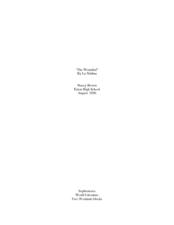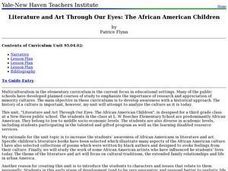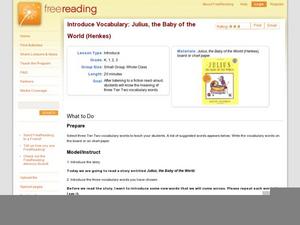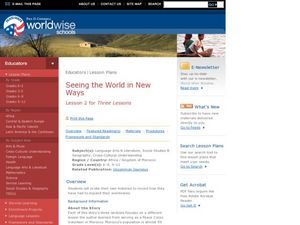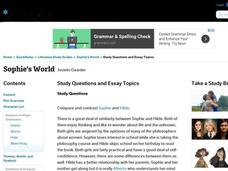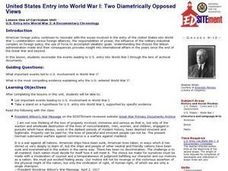Indiana University
World Literature: "One Evening in the Rainy Season" Shi Zhecun
Did you know that modern Chinese literature “grew from the psychoanalytical theory of Sigmund Freud”? Designed for a world literature class, seniors are introduced to “One Evening in the Rainy Season,” Shi Zhecun’s stream of...
Curated OER
World Literature: “The Wounded” By Lu Xinhua
“The Wounded,” the title story from a collection of stories about the Chinese Cultural Revolution (1977-78), is the central text in a World Literature unit examining choices. An anticipation guide, discussion topics, vocabulary list,...
Curated OER
World Creation Myths
After reading creation myths from around the world, use this quiz to test your learners. Five different myths are covered in a multiple-choice format. Increase your scholars' global awareness by studying world literature and cultural myths.
Indiana University
Literature of Asia and the Middle East: "A Sound of Hammering" by Dazai Osamu
Dazai Osamu’s short story, “A Sound of Hammering” is the focus of a three-day investigation of modern Japanese literature and life in post-World War II Japan. The events in Osamu’s story mirror those in his own life, and give a...
Curated OER
Literature and Art Through Our Eyes: African-American Artists
Examine the contributions of African-Americans in the worlds of art and literature. Over the course of a few days, young scholars will read and analyze a poem, a short story, and a piece of art. They complete a range of...
PBS
Arthur’s World Neighborhood: Bibliography for Kids
Support young learners as they expand their cultural awareness with this list of children's literature on countries from around the globe. Including both fictional and non-fictional texts. This resource will help students across the...
Indiana University
World Literature: “Wu Sung Fights the Tiger,” Anonymous - Commentary by Chin Sheng-t’an From Water Margin
Dive into classical Chinese literature with this packet. Provided first is a comprehensive summary and a half-page long historical context of Water Margin. As your class reads the section entitled "Wu Sung Fights the Tiger," pose the...
Curated OER
The Grimm Truth—Comparing & Contrasting Children’s Stories and Fairy Tales in Cross-Cultural Texts at Different Points in Time
Students explore world literature through completing several varied exercises. In this compare and contrast instructional activity students compare and contrast stories and how time and culture impacts the stories.
Curated OER
Women and Korean Literature
Young scholars read a text about women in Korean and their role in Korean literature. In this Korean literature lesson, students read a text by Helen Koh to learn about women writers in Korea.
Curated OER
A Month of Mapping Literature
Explore the world through literature! With push pins to mark where each story came from, learners examine cultural differences, geographical location, and how those elements affect story content. This lesson could use deeper development,...
Maryland Department of Education
The Concept of Diversity in World Literature Lesson 13: Unit Culmination - Symposium
To conclude a unit on the concept of diversity in world literature, class members conduct a symposium on "African Literature in Global Perspectives." In order to earn a spot on the panel, individuals craft an original thesis that...
Maryland Department of Education
The Concept of Diversity in World Literature Lesson 1: Unit Introduction
To launch a unit study of the concept of diversity in World Literature, class members compare Chinua Achebe's essay, "An Image of Africa: Racism in Conrad's Heart of Darkness" and Richard Rodriguez's essay, "The Chinese in All of Us: A...
Curated OER
World Literature From Africa
Students prepare for and respond to literature selections. This package includes twenty-four lessons from the World Literature series, each covering a different reading selection from Africa. Pre-reading and response activities are...
Curated OER
Myths, Folktales, & Fairy Tales
Introduce the concept of myths to your class. Using the link to "Myths Around the World," read a story aloud and have learners list characteristics of a myth. Readers then choose their own myths from the site and work in groups to answer...
Curated OER
Coming of Age During Japanese Occupation: Richard E. Kim's Lost Names: Scenes from a Korean Boyhood
Explore the implications of the Japanese occupation of Korea during World War II. Learners read Lost Names: Scenes from a Korean Boyhood, participate in classroom discussions about the novel and keep journals in which they respond to...
National History Day
More Than Mud and Cooties: The Poetry of World War I Soldiers
Poetry is not just for romance. Teach middle schoolers about soldiers' experiences during World War I with poetry written by the soldiers themselves. The instructional activity includes a simulation activity, a graphic organizer...
Curated OER
Come Fly with Me . . . Open a Book: Travels through Literature
This detailed overview of a curriculum unit suggests using travel literature to engage and stimulate your third graders’ interest in reading. The suggested reading list includes fiction and non-fiction materials and offers urban children...
Curated OER
Deck the Halls with Literature Trees
Reinforce and assess reading comprehension by having your class make a literature tree! After reading a book, pupils make decorations to represent the book's themes, characters, and setting. Materials for decorating can be as diverse and...
Curated OER
Introduce Vocabulary: How to Make an Apple Pie and See the World (Priceman)
Ask budding readers, "How do you make an apple pie?" You may get many answers, but Marjorie Priceman takes the cake with her idea in How to Make an Apply Pie and See the World, an adventurous tale full of wonder and new vocabulary. Using...
Curated OER
Introduce Vocabulary: Julius, the Baby of the World (Henkes)
Lilly is jealous when her new little brother is born; explore vocabulary in context through Kenvin Kenkes' story Julius the Baby of the World. Suggested words for this text are: constantly, disguise, disgusting, extraordinary, quiver,...
Curated OER
Seeing the World in New Ways
Learners examine their own history to expand how they examine the world. They research being a Peace Corps volunteer in Morocco. They also examine Muslim culture.
Spark Notes
Sophie's World by Jostein Gaarder: Study Guide - Mini Essays
Jump online (to Sparknotes), and check out the study questions listed for Jostein Gaarder's Sophie's World. Provide a list of the questions to your high schoolers, and get them in groups to discuss their answers. Potential answers are...
Curated OER
United States Entry into World War I: Two Diametrically Opposed Views
Young scholars analyze the events leading to U.S. entry into World War I. They read a speech by President Wilson and an opposition speech, list the reasons each gives for American entry into the war, and complete a Venn diagram.
Curated OER
A World of Myths
High schoolers read and write myths. In this world mythology lesson, students read and analyze myths from various cultures and then recognize their attributes as they write their own myths to explain natural phenomena.
Other popular searches
- High School World Literature
- World Literature Genres
- World Literature Eras
- World Literature 10th Grade
- World Literature Greek
- World Literature Poetry
- World Literature Italian
- World Literature Unit Plan
- Cultures World Literature



